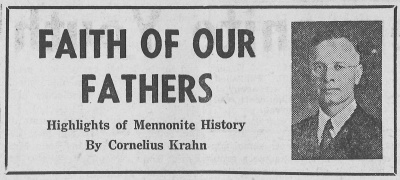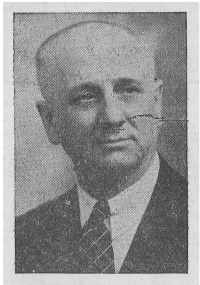If this site was useful to you, we'd be happy for a small donation. Be sure to enter "MLA donation" in the Comments box.
Smith, C. Henry (d. 1948): Difference between revisions
No edit summary |
No edit summary |
||
| Line 60: | Line 60: | ||
<center>'''Educator and Writer'''</center> | <center>'''Educator and Writer'''</center> | ||
Soon Dr. Smith accepted a call to Goshen College where he served as dean from 1908-1913, thus becoming one of the early educators of that institution. From then on, with the exception of one year, he taught at Bluffton College until his recent retirement. In 1920 his book, '''The Mennonites,''' covering the Mennonites the world over, was published by the Mennonite Book r Concern, Berne, Indiana. In 1926-27 he was guest professor at Bethel College and pursued special studies concerning the Mennonites in this section of the country that had come from Russia. As a result of this and extensive study of the source material as found in the Library of Congress, diaries, and other material he wrote '''The Coming of the Russian Mennonites''' which was published by the Mennonite Book Concern in 1927. This was soon followed by a volume in '''The Mennonite Immigration to Pennsylvania''' which was prepared at the request of the Pennsylvania-German Society and published by that organization in 1929. In addition he has written some shorter books and numerous articles in various periodicals. | |||
The crown of his life work is '''The Story of the Mennonites''' published in 1941 by the Mennonite Book Concern. As the title indicates this book is not burdened with the scholarly apparatus of footnotes and bibliography and the danger of becoming lost in hair-splitting details. It is the most inclusive and most up-to-date history of the Mennonites in existence today. Since it is almost sold out Smith was already planning a revised edition. Just before he passed away news reached him that '''The Story of the Mennonites''' had been translated into the German language by a famous German educator. It is hoped that it will be financially possible to publish it. | |||
The fruitful life of C. Henry Smith was shared and supported by his loyal companion, Laura Louise Yoder Smith, whom he married in 1809. | |||
“Remember your leaders, the men who spoke the word of God to you; look back upon the close of their career, and copy their faith.” Heb. 13: 7. | |||
''The Mennonite'' obituary: 26 | ''The Mennonite'' obituary: 1948 Oct 26 p. 4; 1948 Nov 9 p. 5 | ||
[[Category:Mennonite Weekly Review obituaries]] | [[Category:Mennonite Weekly Review obituaries]] | ||
[[Category:The Mennonite obituaries]] | [[Category:The Mennonite obituaries]] | ||
Latest revision as of 19:04, 4 May 2015
Mennonite Weekly Review obituary: 1948 Oct 28 p. 1
Birth date: 1875 Jun 8
text of obituary:
Hold Final Services For Well-Known Mennonite Historian
DR. C. HENRY SMITH DIED AT HIS BLUFFTON, OHIO HOME ON OCTOBER 18
Bluffton, Ohio. — Funeral services were conducted at the First Mennonite church here on Thursday afternoon, Oct. 21, for Dr. C. Henry smith, well-known Mennonite historian and for many years professor of history at Bluffton College. Rev. J. N. Smucker, pastor of the church, officiated.
Dr. Smith passed away at his home here on Oct. 18 of a heart attack. He had been in ill health for several months, and had undergone an operation at Lima Memorial hospital two weeks earlier. he is survived by his wife, the former Laura Yoder.
The books on Mennonite history written by Dr. Smith are widely used throughout the Mennonite constituency, and are recognized as authoritative in this field. Among them are “The Mennonites of America,” “The Coming of the Russian Mennonites,” “Menno Simons,” and “The Story of the Mennonites.”
Dr. Smith was born at Metamora, Ill. on June 8, 1875, and attended the Illinois State Normal University. He received his A.B. degree from The University of Illinois and the masters and doctors degrees from the University of Illinois and the history at the Elkhart Institute, later served as dean of Goshen College, and had been professor of history at Bluffton College since 1913, the last two years as professor emeritus.
He was for many years active in church and civic affairs, having served as president of the Citizens National Bank here and the First National Bank at Pandora. At the time of his death he was a member of the Publications Board of the General Conference, and in recent years had given considerable time to editorial work on the Mennonite encyclopedia now being prepared.
Mennonite Weekly Review obituary: 1948 Oct 28 p. 5
text of obituary:

C. HENRY SMITH (1875-1948)
C. Henry Smith, known widely and loved generally, passed away October 15. An active, fruitful, and complete life came to a close. He was a fine gentleman, a consecrated Christian, and a pioneer Mennonite educator and historian. It is fitting therefore that we pause for a moment to review briefly his life and contributions. Because of the nature of this column we will pay special tribute to his significance as a Mennonite historian.
Dr. Smith was probably more of an All-Mennonite by background, development and conviction than anyone else of his significance. Raised in an Amish Mennonite home, active as a pioneer educator of the (Old) Mennonites, devoting most of his life to education among the Mennonites of the General Coference, and by the nature of his study and character he was predestined to elevate Mennonite research to a plane of objectivity and inclusiveness far beyond that which it had been and still is in large circles of the brotherhood. This objectivity by no means led either him or his students to indifference. On the contrary it resulted in a deeper and more conscious appreciation of and loyalty to Mennonite principles because they are basically Christian.

Dr. Smith was the first Mennonite in America to receive a Ph. D. for a dissertation based on a Mennonite subject. Quantitatively and qualitatively he has produced more in this field than anyone else in this country. He deserves most credit for the new generation of Mennonite scholars in America, for the present interest in Mennonite principles, the flourishing publications in forms of books and magazines and the number of young people working on dissertations for higher degrees in this field.
The scholarship of C. Henry Smith was recognized and fully established by learned societies in this country and abroad. European scholars consider his works the best concerning the history and background of American Mennonites. In the history of American Mennonite research Smith ranks with Christian Hege and Christian Neff in Germany and S. Cramer and W. Kuehler in The Netherlands. C. H. Wedel and John Horsch, possibly because they were European born, mastered phases of the European scene but lacked Smith's thorough general knowledge and balanced presentation of Mennonitism the world over. This does not mean that there were no phases of Smith's work which did not need a more thorough investigation or a more balanced presentation. Shortcomings are noticeable, for example, when he speaks of groups with a strong emphasis of the emotional Christian experience. However, he was the last to deny his limitations.
The total findings of his work dealing with the European and American Mennonites presented in more than five volumes stand as a monument which for some time to come will remain the standard references in the English language on European and American Mennonites.
The best information about the background, development and early activities of C. Henry Smith is found in his autobiography which he wrote when he was fifty years of age and of which he made some mimeographed copies in 1943 under the title The Education of a Mennonite Country Boy, an account which he wrote not because he felt “a claim to greatness” but because of an “inner urge.”
C. Henry Smith was born June 8, 1875, at Metamora, Illinois, as the third member of a family of eight. His forefathers had come to this country from Alsace-Lorraine at the beginning of th 19th century. His father was biship [sic] of the Amish Mennonite community. Vividly and interestingly he describes in the chapter “Following Church” how he was brought up in the religious beliefs and practices and how he became a member of that church. “It was just as much a question of conviction with us as it was with those who may have been swept into the church on a wave of emotionalism set going by a series of revivals,” he states.
Unusual for an Amish Mennonite boy was the fact that he went to high school, taught school, and attended the State Normal University at Normal, Illinois, and taught at the newly founded Elkhart Institute, Elkhart, Indiana (1898-1900). Continuing his study he received his B. A. in 1902 from the University of Illinois, his M.A. in 1903, and his Ph.D. in 1907, both at the University of Chicago. This was eventful, no only in the life of a knowledge-thirsty young man but also in the history of the American Mennonites.
Being interested in history in his early graduate study he was asked to prepare a paper on the Mennonites, a subject which he had never studied. This marked the beginning of his career. He became the chairman of the History Club, studied the Mennonites more intensely in the library of John F. Funk, and the historical collections of Pennsylvania and Virginia, and prepared a doctor’s dissertation which he published privately the title The Mennonites of America in 1909.
During his studies he did not neglect his religious life. About the YMCA of which he was the president he states, “My connections . . . with the YMCA I regard as one of my most valuable experiences of my student life.”
Soon Dr. Smith accepted a call to Goshen College where he served as dean from 1908-1913, thus becoming one of the early educators of that institution. From then on, with the exception of one year, he taught at Bluffton College until his recent retirement. In 1920 his book, The Mennonites, covering the Mennonites the world over, was published by the Mennonite Book r Concern, Berne, Indiana. In 1926-27 he was guest professor at Bethel College and pursued special studies concerning the Mennonites in this section of the country that had come from Russia. As a result of this and extensive study of the source material as found in the Library of Congress, diaries, and other material he wrote The Coming of the Russian Mennonites which was published by the Mennonite Book Concern in 1927. This was soon followed by a volume in The Mennonite Immigration to Pennsylvania which was prepared at the request of the Pennsylvania-German Society and published by that organization in 1929. In addition he has written some shorter books and numerous articles in various periodicals.
The crown of his life work is The Story of the Mennonites published in 1941 by the Mennonite Book Concern. As the title indicates this book is not burdened with the scholarly apparatus of footnotes and bibliography and the danger of becoming lost in hair-splitting details. It is the most inclusive and most up-to-date history of the Mennonites in existence today. Since it is almost sold out Smith was already planning a revised edition. Just before he passed away news reached him that The Story of the Mennonites had been translated into the German language by a famous German educator. It is hoped that it will be financially possible to publish it.
The fruitful life of C. Henry Smith was shared and supported by his loyal companion, Laura Louise Yoder Smith, whom he married in 1809.
“Remember your leaders, the men who spoke the word of God to you; look back upon the close of their career, and copy their faith.” Heb. 13: 7.
The Mennonite obituary: 1948 Oct 26 p. 4; 1948 Nov 9 p. 5